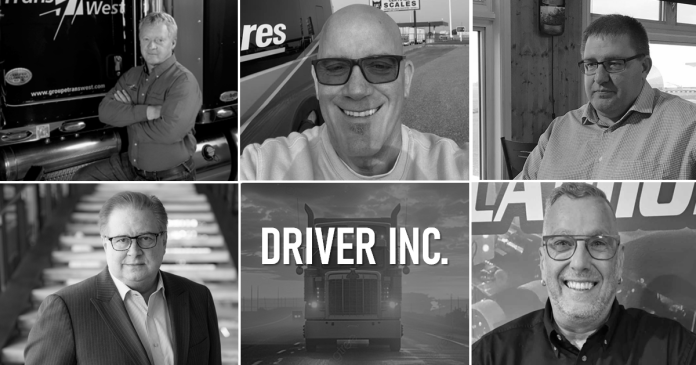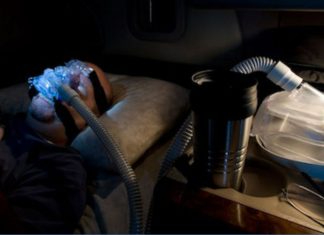On Tuesday, December 10, business leaders and company executives gathered on Truck Stop Québec (TSQ) to discuss the Driver Inc. scheme and the severe consequences of governmental inaction.
Among them were Réal Gagnon, CEO of Trans-West; Marcus Deschênes, CEO of Transport Gilmyr; Yvan Domingue, Director of Personnel and Recruitment at Transport Grayson; Pierre Labrie, Director of Recruitment and Training at Groupe Bernières; and Marc Cadieux, CEO of the Association du Camionnage du Québec (ACQ).
This issue, which affects not only the trucking industry but also the economy and public safety, has sparked unprecedented outrage.
Réal Gagnon was the first to publicly denounce this blight on TSQ a few months ago. Yet, the scheme continues to grow, amplifying its destructive impact on the industry and threatening its dismantlement.
“First, it’s a lack of political courage,” Gagnon criticizes. “Second, the government is aware of everything. Everyone has seen the federal document about driver misclassification, but no action has been taken. I’d like to know, what does Pierre Poilièvre think about this? What will he do about Driver Inc. if he comes to power? Or will he follow Trudeau’s lead and keep turning a blind eye?”
Devastating Economic Consequences
Marc Cadieux of the ACQ highlights the challenges this scheme imposes on legitimate companies:
“Profit margins are razor-thin. When you’re competing against businesses with operating costs 25 to 30% lower than yours, it’s impossible to compete—it just can’t be done.”
Beyond its direct impact on companies, this model also deprives governments of billions in tax revenue—money that should fund schools, infrastructure, and hospitals. This loss exacerbates current economic challenges. Yvan Domingue warns:
“Wake up! We’re heading for bankruptcy! Not just company bankruptcies, but a state bankruptcy! Billions of dollars aren’t being collected, jobs are being lost, and we can’t compete with this model. It’s not just a Québec problem—it’s pan-Canadian. The government chases after us for $22 in unpaid taxes, yet lets those exploiting the scheme get away with billions.”
Every truck, every driver, and every legitimate company being replaced by fraudulent practices adds fuel to the fire.
“To politicians turning a deaf ear: this is urgent!” exclaims Marcus Deschênes. “Look at Ontario—large companies are either selling off or shutting down entirely. Companies with 400 trucks are down to 50 or 60. It’s devastating, especially since Québec has strong talent, excellent employees, great companies, and the best training centers in Canada. Where are we headed?”
Alarming Fraudulent Practices
Gagnon detailed the fraudulent practices enabled by this scheme. Driver Inc. operators and their employers evade taxes and fees, creating unfair competition. For Trans-West, a company playing by the rules, this amounts to a $12 million annual cost disparity compared to fraudsters. These businesses operate without insurance, use unsafe vehicles, neglect towing fees, and employ drivers without proper certifications—or worse, without valid licenses. Gagnon even recounts how his company lost $80,000 worth of fuel to these fraudsters.
“How are we supposed to stay competitive against this?” Gagnon asks, exasperated. “Do we have to resort to the same tactics? I’m not willing to stoop to stealing fuel, but will it come to that?”
Serious Risks to Public Safety
The risks to road safety are alarming. Pierre Labrie expresses his concerns:
“Take Highway 401 as an example—it’s a record-breaking year for accidents, and winter has only just begun. My concern is that these drivers aren’t properly trained. I saw an ad for heavy vehicle training being run out of a basement in Québec on TEAMS. Would I want my kids on the road with these drivers? Absolutely not.”
Compounding these safety concerns, skyrocketing insurance premiums are making the situation unsustainable for many in the industry.
“It’s not just about rising insurance premiums,” Gagnon adds. “The problem is when these drivers hit us. I’ve had multiple trucks wrecked—one driver lost a wheel and crashed into the front of our truck. We lost the truck, the cargo, and two drivers are on workers’ compensation and will never drive again. In another case, a driver hit us in a curve, flipping our equipment into a rock embankment.”
Gagnon describes the financial toll:
“It cost us $250,000 to clean up spilled oil, $300,000 in towing fees, and we got nothing for our equipment. Altogether, these incidents added up to over $1 million on top of our premiums. And we weren’t compensated.”
Yvan Domingue shares similar experiences, highlighting the frequency of these incidents and the near impossibility of recovering damages from Driver Inc. operators.
“Every week, we deal with accidents. Our drivers park to sleep at truck stops and end up sideswiped by Driver Inc. operators. They take off, and we’re left with the damage.”
Another Tragedy on the Horizon?
Many fear a repeat of the Humboldt Broncos tragedy in Saskatchewan, where a poorly trained Driver Inc. operator caused an accident that killed 16 and injured 13. Marcus Deschênes stresses:
“It was a Driver Inc. operator in Humboldt. Let that sink in.”
Pierre Labrie warns:
“We’re headed for more tragedies—it’s only a matter of time.”
The risks extend beyond the industry, threatening public safety for all road users. The erosion of trust in the transport sector will only deepen if such incidents continue.
Collective Mobilization Needed
Réal Gagnon calls on industry professionals and citizens to unite:
“We all have a vote. Let’s support a government or representative willing to address this issue and enforce the law. Through the ACQ, we could rally as many as 500,000 people to back a party ready to take action.”
He emphasizes the impact on struggling families:
“Families across Québec and Canada are taxed at 40% or more, yet billions of dollars remain uncollected by the government. Meanwhile, Driver Inc. operators steal jobs, fuel, and tax revenue. It’s infuriating.”
The trucking industry and the public must mobilize to eradicate the Driver Inc. scheme. Immediate collective action is essential. Transporters, drivers, brokers, and citizens must demand concrete measures from authorities.
“STOP DRIVER INC. Write to your MP. Together, we are stronger.”
















